Before and after video - incredible! All building there are just gone.
View attachment beirut-explosion-hp-sldr.mp4
View attachment beirut-explosion-hp-sldr.mp4

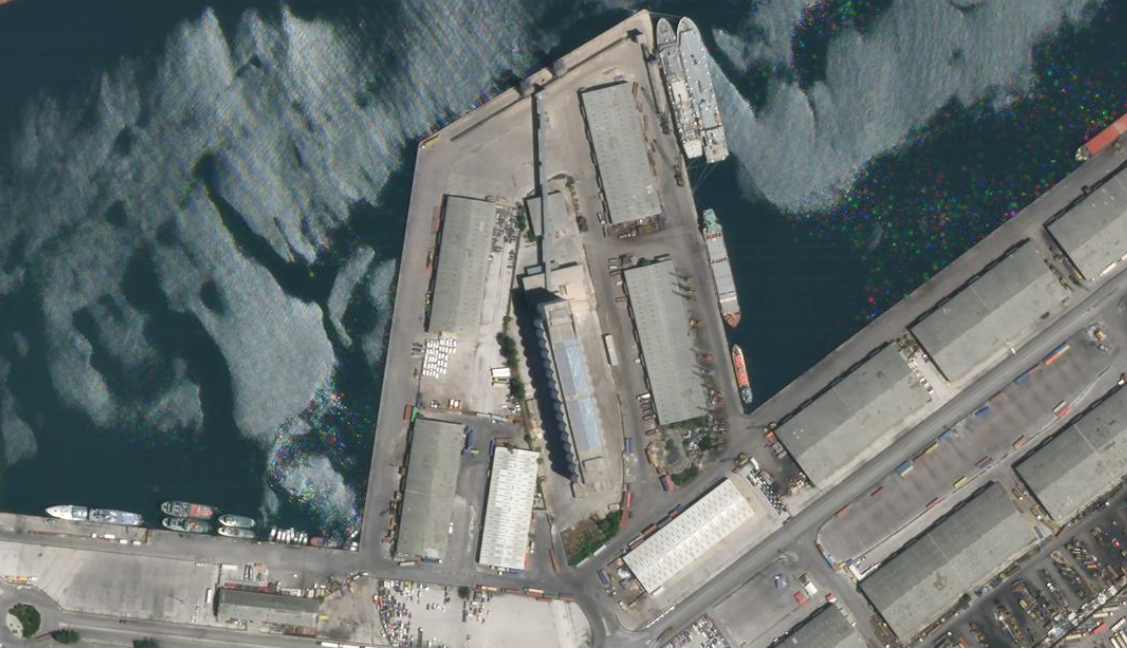
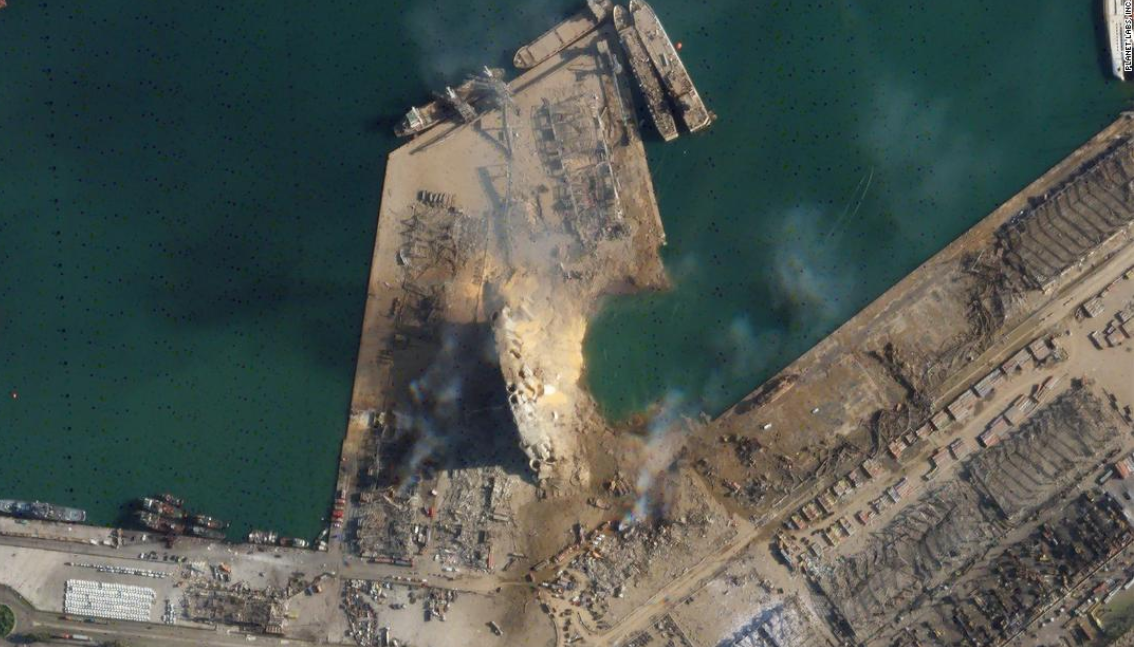
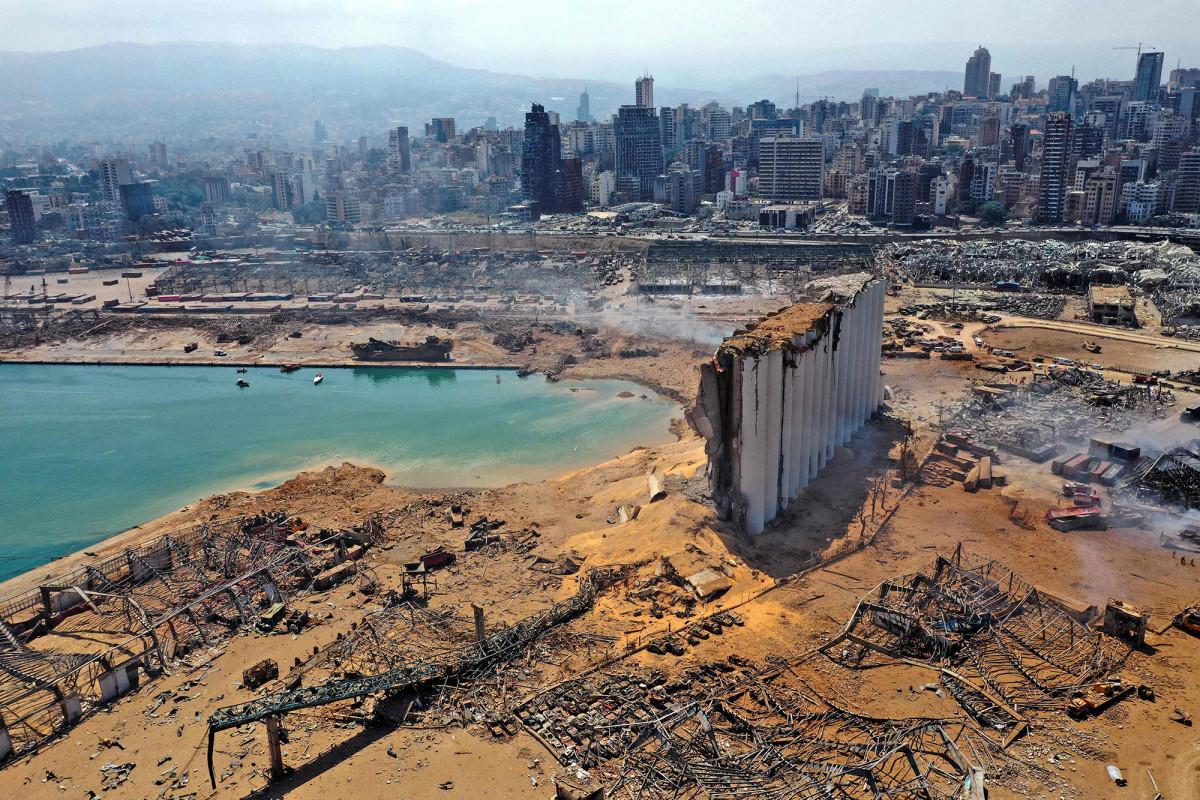
Ammonium nitrate is tricky stuff...technically, it's classed as a 'blasting agent' rather than a high explosive. When ANFO (Ammonium Nitrate + Fuel Oil) is used as a commercial blasting product, it is normally set off with a dynamite charge; unless it's already hot it requires an external detonation to do so. In this case there was a nearby explosion and fire, which effectively makes the stuff more sensitive. All of that being said, storing it in the same warehouse as black powder fireworks is pretty much the same thing as storing blasting caps with dynamite. Really dumb, and certainly illegal in the US.Now we know:
https://en.wikipedia.org/wiki/2020_Beirut_explosions
A first, smaller, explosion sent a cloud of smoke above the fires and created flashes of light said to resemble fireworks.[21] The second explosion was much more substantial and occurred at about 18:08 local time.[22][21] It rocked central Beirut and sent a reddish cloud into the air, believed to be nitrogen dioxide—a breakdown product of ammonium nitrate.
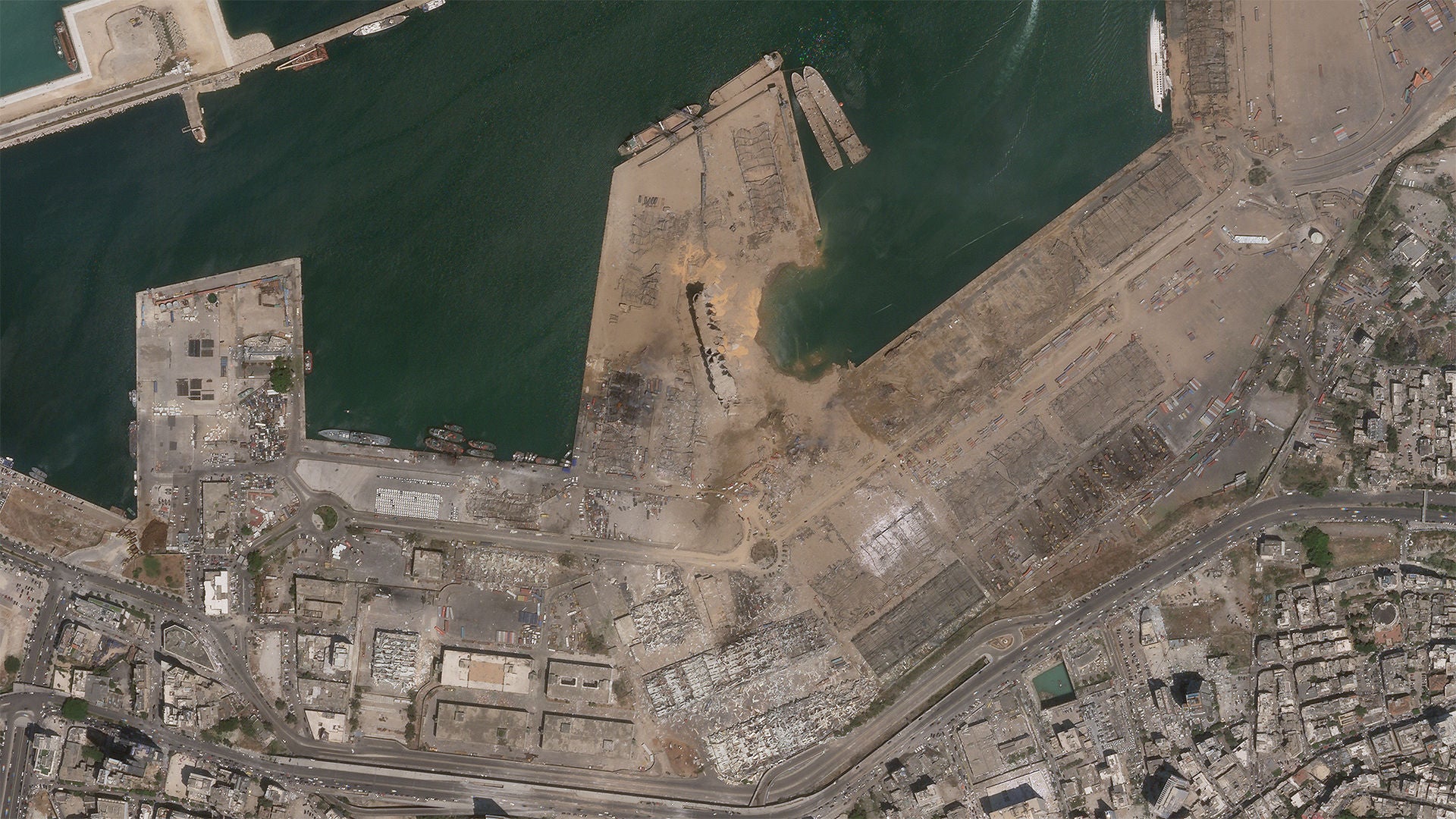
Sounds similar to the Oppau explosion, but the details are different.Old historical bit - many years ago, the explosive nature of AN was not yet known - a manufacturing plant that synthesized the stuff (in Switzerland, IIRC) suffered a rupture that spilled molten ammonium nitrate in a layer a few feet thick all over the plant. Remarkably, there was no fire, and it solidified. Unfortunately, the cleanup crew decided that the quickest way to remove it was to break it up with dynamite. The result was similar to Beirut; broken windows for miles, and very little left of the plant. Although it is (normally) pretty insensitive, when ammonium nitrate 'goes off' it mass detonates - all of it goes at once, and it need not be confined!
The yield of AN is lower than that of TNT, but varies depending on the conditions.Consider this - if detonating ammonium nitrate has approximately the same explosive power as TNT, the Beirut waterfront received the equivalent of a 2-3 kt tactical nuclear device in a ground burst. The level of damage certainly supports the theory.
You didn’t get out much, did you?When I was a kid the school library had a book, "Handbook of reactive chemical hazards" or some such. It had all kinds of stories that ended in boom. I used to read it at lunchtime.
Thanks! Did not know that bout the keys.Just for those that don't know: In Youtube you can use the K key to stop the video, and then the , (comma) and . (Period) keys to step back and forth frame by frame, J and L jump back or forward 10 seconds. Also (shift + <) and (shift + >) to go slow or fast motion, from .25X speed to 2X
The explosion, on August 4, at around 6pm local time, appears to have been fuelled by 2,750 tons of the highly reactive chemical ammonium nitrate. The chemical had been the cargo on a ship, the the MV Rhosus, which entered the port at Beirut in 2013 due to a lack of seaworthiness and was prohibited from sailing. After the ship’s owner abandoned the vessel soon afterwards, the ammonium nitrate remained in a storage facility in Beirut’s port.
While the disaster itself was exceptional, the events leading up to it were not. Hazardous material is shipped across the world’s oceans on a daily basis. It is often mishandled or illegally traded. Abandoned containers of hazardous goods are found regularly in ports.
While maritime security tends to focus on preventing high-profile events such as piracy, terrorism or cyber-attacks, all too often it is daily mishandling that makes disasters possible. Part of preventing disasters such as what has happened in Beirut will mean strengthening port management and addressing crimes such as smuggling and corruption.
Abandoned ships
The International Maritime Organization (IMO) has recorded 97 cases of abandoned ships and crews since 2017. Ships are abandoned by their owners if a ...

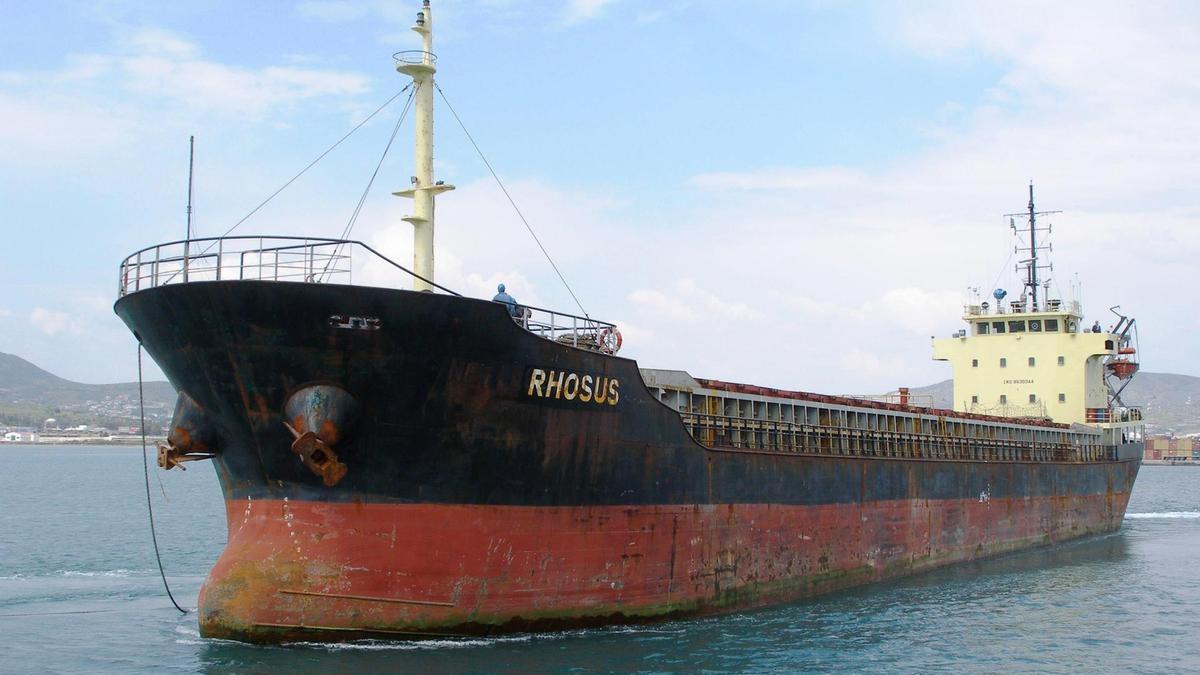
He should be found, arrested and tried for gross negligent homicide."He Abandoned The Deadly Cargo": Meet The Mysterious Businessman At Center Of The Beirut Blast Saga
6 Aug 2020
https://www.zerohedge.com/geopoliti...sterious-businessman-center-beirut-blast-saga
...the almost unbelievable story of how the explosive substance got there has emerged. It's centered on a derelict and leaking vessel leased by a Russian businessman living in Cyprus. In 2013 the man identified as Igor Grechushkin, was paid $1 million to transport the high-density ammonium nitrate to the port of Beira in Mozambique. That's when the ship, named the Rhosus, left the Black Sea port of Batumi, in Georgia.
But amid mutiny by an unpaid crew, a hole in the ship's hull, and constant legal troubles, the ship never made it. Instead, it entered the port of Beirut where it was impounded by Lebanese authorities over severe safety issues, during which time the ammonium nitrate was transferred off, and the largely Ukrainian crew was prevented from disembarking, leading to a brief international crisis among countries as Kiev sought the safe return of its nationals.
Meanwhile, Igor Grechushkin - believed to still be living in Cyprus - reportedly simply abandoned the dangerously subpar vessel he leased, as well as its crew, never to be heard from again.
The ammonium nitrate was supposed to be auctioned off, but this never happened. Apparently exasperated customs and dock officials even suggested Lebanese farmers could simply spread it across their fields for a good crop yield. But not even this simple solution was heeded, nor proposals to give it to the Lebanese Army.
Instead the deadly substance languished at port, and the Rhosus sank in the harbor years later. The last crew members weren't allowed to leave the ship and return home until August 2014. Grechushkin may have paid for their return tickets at that time.
Astoundingly, even lawyers which had represented the effectively abandoned crew of the ship (which Ukrainian media at the time said were "hostages" of the Lebanese government) while it had been detained at port warned Lebanese government officials that the sensitive cargo was in danger “of sinking or blowing up at any moment”.


Was he the one who offloaded it to the warehouse? Was he the one that didn't move it from the warehouse for 7 years?He should be found, arrested and tried for gross negligent homicide.
That is a very good point.It would be an even worse disaster if something like this didn't result in a reform of policies in many places so it never happened again.
You're right. However, he had a responsibility to not abandon hazardous materials.Was he the one who offloaded it to the warehouse? Was he the one that didn't move it from the warehouse for 7 years?
He appears to be scum and I'm sure should be in jail somewhere but I don't think this can be put squarely on his shoulders.
You're right. However, he had a responsibility to not abandon hazardous materials.
All involved should be prosecuted.
Meanwhile, what happened to the fireworks story?
The Beirut Port Authority had tried a number of times to get some judicial standing on getting rid of the AN. And they never received a reply to their letters. Since the cargo had been abandoned lawyers got involved and in order to get rid of it a Court decision needed to happen, which never did.You know that all over the world storage areas near ports, and other shipping facilities where cargo gets left behind for years, managers are doing an audit to see what's there which may be a problem. Leaders of countries are working on changing laws to prohibit abandoned cargo from being left behind like this.
It would be an even worse disaster if something like this didn't result in a reform of policies in many places so it never happened again.
No doubt. And I wasn't saying there were currently zero laws or policies to keep this from happening, I meant that the existing laws were going to be changed (or new ones created) which had more teeth in it than whatever the Port Authority was using. And courts will no longer be able to postpone decisions on cases like these for years.The Beirut Port Authority had tried a number of times to get some judicial standing on getting rid of the AN. And they never received a reply to their letters. Since the cargo had been abandoned lawyers got involved and in order to get rid of it a Court decision needed to happen, which never did.
From danger close. I wonder how these people are doing.
My understanding is that several of the videos we've seen are from cell phones taken from fatalities.From danger close. I wonder how these people are doing.
Enter your email address to join: